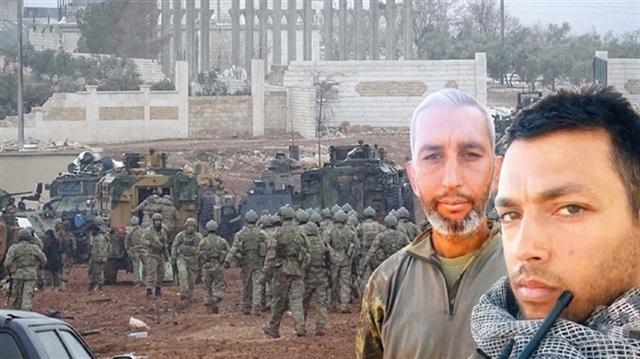
Muhammad H., a translator for Turkish soldiers, witnessed an attack on two Turkish sergeants in Syria’s al-Bab believes that the Pentagon was involved in their kidnapping
Operation Euphrates Shield, which Turkey launched in Syria’s Jarabulus on Aug. 24, 2016 to combat the increasing terror threats on the southern border, lasted for 213 days. An area of 2,100 square kilometers was cleared of Kurdistan Workers’ Party (PKK) and Daesh terrorists by the Turkish Armed Forces (TAF). During the operation, 71 Turkish soldiers were martyred. The most challenging area tackled by the TAF and Free Syrian Army (FSA) was al-Bab. The most critical point of the operation which delivered a huge blow to the PKK terror corridor that reached from Iraq to Turkey was when Turkish bases in al-Bab were struck and various sabotages were conducted to stop the advance of Turkish troops. On Nov. 29, 2016 two Turkish sergeants were kidnapped in the al-Bab-Dane district. Yeni Şafak contacted Muhammad H., who was the interpreter of the Turkish soldiers on the day of the kidnapping. The Syrian translator that said there was a US-Pentagon link in the kidnapping.
Muhammad H., who was born and raised in a Turkmen village in Syria’s north, described an attack that he described as a “pre-meditated trap.”
“Kıvanç Kaşıkçı (24) and Muhammed Duran Keskin (28) called me on the morning of the event and they said that they would take me to see an Arab from the opposition and that I would translate during the meeting. Then they took me and the person they were going to meet with to the Turkish base in the Kifre region. While traveling, an armed pickup truck from the FSA protected us. We returned using the same route at around 1:00 p.m. with the person who came from Idlib, who I translated for, and sergeants Kaşıkçı and Duran,” he said.
“The soldiers who accompanied us on the way to Kifre and belonged to the FSA brigade who served in the region did not accompany us during our return. (This brigade is one of the three groups linked to the Pentagon in the region.) We traveled for a short period of time and came to the countryside of the Dane village. As soon as we arrived in the area, a passing motorcycle with two people on it started to open fire. At that moment, two more people came out of the olive trees and started to shoot us. The attackers were wearing FSA outfits. Commander Kıvanç said they didn’t recognize us and that they were from the FSA, so he disembarked. That’s when I saw that Commander Muhammed was shot. The weapons were in the back seat of the vehicle. Only one of the automatic rifles was beside Commander Kivanç. However, because they fired continuously, we could not take the weapons. All three of us were sitting on the front seat,” Muhammad said.
“We got out of the car and entered the empty vineyard house. Some of the walls around the back were demolished. Commander Kıvanç said that if we remained there, they wouldn’t let us live and that we should run toward the olive trees. We started to run toward the olive trees together. I lost the commander a few minutes later. My foot was wounded but I was able to reach the closest checkpoint. When the shooting stopped, I called the Turkish base and said that we were attacked. Major Bülent Albayrak notified the Pentagon group 200 meters away. However, despite the sound of gunshots lasting 15 minutes, nobody intervened. Despite the instructions of Major Albayrak, who received the news of the attack, no soldier from that point came to the scene of the incident,” he added.

“When I arrived at the control point of the Pentagon-affiliated group, I heard an announcement from the radio saying that the translator should not be left alive. However, Bülent Albayrak, the commander, called the leader of the group and told him that he would be there soon and that nobody should talk to or touch me before he arrives, which is why they did not do anything to me. Major Bülent came to the scene but Kıvanç Kaşıkçı and Muhammed Duran were kidnapped,” Muhammad said.
“The first attack on us was made by the terrorists on the motorcycle. These motorcycles came from the Pentagon-linked group’s checkpoint. I told our Turkish commanders everything we experienced in full detail. They took me in and protected me for a while and issued orders to all FSA groups. The commander of the group who did not intervene despite the continuous gunshots demanded my presence many times but I asked the Turkish officers not tı send me to them, so I survived,” he added.
When Major Bulent Albayrak reached the region, Kıvanç Kaşıkçı and Muhammed Duran Keskin were kidnapped. The two soldiers were reportedly killed by Daesh. Albayrak was martyred 23 days later at al-Bab’s Sheikh Akil Hill in a bomb-laden vehicle attack. He was one of 12 Turkish soldiers who were martyred in the attack. In the coming days, control was established over Akil Hill and al-Bab. Photographs of the Turkish martyrs were unfurled around the city.
Sergeants Kıvanç Kaşıkçı and Muhammed Duran Keskin were kidnapped and martyred on Nov. 29 2016 “by Daesh.” A Turkish soldier was killed in a missile attack on the Kifeyr military base in the same region they were abducted from. The perpetrators of the attack are still a mystery. It is alleged that the TAF army base in Kifeyr was attacked by the U.S.

Hello, the comments you share on our site are a valuable resource for other users. Please respect other users and different opinions. Do not use rude, offensive, derogatory, or discriminatory language.
The floor is all yours.









